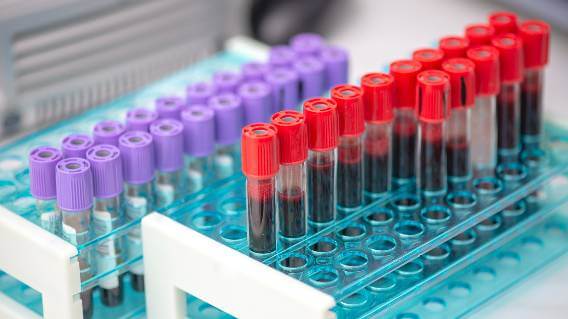Blood Serum Diagnostic Test for Mesothelioma Explored in Study

One of the biggest obstacles to treating pleural mesothelioma cancer effectively is its often late-stage diagnosis. A recent study shows encouraging signs that those days could be ending.
Novel diagnostic testing using blood serum and infrared spectroscopy is being explored to better characterize and differentiate mesothelioma in its early stages from other lung diseases and benign effusions.
The study is being conducted by scientists and doctors in Ankara and Istanbul, Turkey, spread through various hospitals and university medical centers within the region. Biochimica et Biophysica Acta – Molecular Basis of Disease will publish the study in October 2022. Science Direct released an online version June 23.
“As the symptoms of mesothelioma usually take decades to become noticeable, timing is the worst aspect of this disease,” co-author Dr. Feride Severcan, Altinbas University Faculty of Medicine, told The Mesothelioma Center at Asbestos.com. “An early diagnosis from easily collected blood serum is a very valuable approach, increasing the chance of successful treatment and survival rate.”
Early Diagnosis Allows for More Treatment Options
Because of mesothelioma’s typical late-stage diagnosis, less than 25% of pleural mesothelioma patients even qualify for aggressive surgery and the most effective multimodality treatment.
The majority of patients diagnosed with pleural mesothelioma receive only standard chemotherapy and have a median survival of 12 months. Most are not diagnosed for at least 30 years after first being exposed to toxic asbestos fibers, the primary cause of the disease.
Mesothelioma is a rare cancer that is diagnosed in an estimated 3,000 people annually in the U.S. Dry cough, slight shortness of breath, fatigue, muscle weakness, hoarseness and difficulty swallowing are common early symptoms of mesothelioma, but these are also similar to signs of other benign or malignant diseases. The average age at diagnosis is 74.
A mesothelioma diagnosis is often a drawn-out process that usually starts with imaging studies, including chest X-rays, CT, MRI and PET scans. It eventually moves to more invasive surgical procedures such as a thoracentesis to obtain a biopsy sample and a thoracoscopy for a pleural tissue biopsy.
“It would be critical to find new diagnostic approaches, which are accurate, preferably noninvasive, rapid, low-cost, operator independent and able to create reliable information,” Severcan said. “An early and accurate diagnosis of MPM [malignant pleural mesothelioma] is essential to decreasing the morbidity rate.”
Study Accuracy Rate Is Promising
The study started with blood serum samples, regardless of pleural fluid status, which typically doesn’t occur until the later stages of disease. The tool being used is called an attenuated total reflectance-Fourier transform infrared spectroscopy, or ATR-FTIR, that can help analyze even small amounts of blood serum.
Samples were obtained from 25 patients with malignant mesothelioma, 31 with lung cancer, 26 with nonmalignant pleural effusions and 30 healthy individuals to serve as a control group. The aim was to differentiate between lung cancer, benign effusions, healthy tissue and mesothelioma through various biomarkers.
For the four different groups, a linear discriminant analysis was obtained with an 87.5% accuracy rating, showing promising potential.
The results demonstrated the biomolecular composition and structural differences between the four groups of serum samples.
“Based on FTIR measurements, the molecular fingerprints of serum samples can be obtained and the structural and compositional changes in the components of that fluid can serve as biomarkers for early signs of the disease,” Severcan said.
Essentially, the testing could result in an early diagnosis of mesothelioma prior to obvious symptoms. It could be done easily for high-risk, asbestos-exposed populations. The noninvasive approach would likely be welcomed by anyone who had a history of exposure.
If utilized, the approach could help identify the disease and start the mesothelioma treatment process sooner, when success is more likely.
“An early diagnosis from easily collected blood serum is a very valuable approach,” the authors concluded. “In the absence of reliable noninvasive diagnostic tests today, there is a critical need. Our study can be a guide for future studies.”